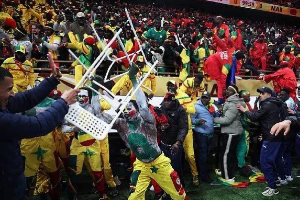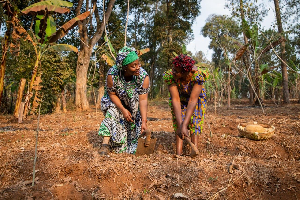Prof. Gyimah-Boadi, Executive Director of Centre for Democracy and Development (CDD), on Tuesday said the NDC and NPP have equal chances in the presidential run-off. Speaking in an interview with the GNA, he said supporters of the five eliminated parties constitute a pool of floating voters from which both the NDC and NPP could win majority votes.
"This is based on the effectiveness of their campaign in the next 21 days as the loyalty of members of the eliminated parties to their leaders is not certain," he said.
"It is one thing for a party leader to declare his support for another party, and it is another thing to convince his followers to vote for that party." Prof. Gyimah-Boadi said the support the NPP enjoys from the leaders of the five eliminated political parties is based on the vague sense of voters that "we must have change after 20 years of PNDC-NDC rule, no matter what." He said this vague, but non-rational desire for change might work for the NPP in the second round of elections.
"An NPP win in the second round of elections will largely be because the people seem to have experienced a sense of lifting from how the NPP beat the incumbent. This feeling is vague and non-rational". Prof. Gyimah-Boadi, however, said the NDC has for the past eight years proved to be very resourceful when it came to winning power. "I believe in the ability of the NDC to stage a successful come-back, especially when it is about winning power "If only the NDC can use that same level of resourcefulness to govern this country, we would be better off." He said Vice-President John Atta Mills is capable of winning as many floating votes as possible, "provided he is allowed to run his own campaign and project his image and qualities to the electorate."
Prof. Gyimah-Boadi noted that the voting pattern this year reflected a cleaner electoral process, as compared to that of 1992 and 1996. "Had the electoral process been that cleaner in 1992 and 1996, the results would not have been any different in those past two elections. "The results of this year's elections are only a reflection of what the unclean electoral process and unlevelled playing field denied the people in 1992 and 1996. We no doubt had a cleaner voters register and a level playing field this time round," he said.
He attributed this to the photo ID card system and the more equitable media accessibility for all the political parties. Prof. Gyimah-Boadi said, "the question was not about how long the NDC has been in power, nor how much the other political parties campaigned. The system was more transparent this time.
"In 1992 and in 1996 there were only about 5000 domestic observers with a few political party agents. This time we had over 10,000 domestic observers and more political party agents who were very vigilant." He said this, to a large extent, prevented any particular political party from manipulating the process to its advantage, as was the case in 1992 and 1996. Referring to the voting trend in the Volta and Ashanti regions, Prof. Gyimah-Boadi urged the electorate to eschew tribal sentiments and allow issues to determine the pattern of voting in the second round of elections.
General News of Wednesday, 13 December 2000
Source: GNA












